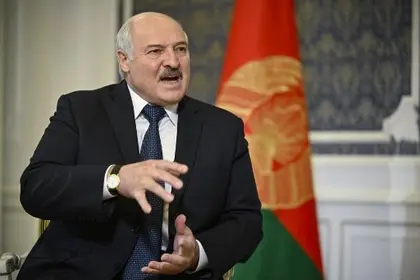The Kremlin’s ongoing campaign to bombard Ukraine’s citizens into submission with kamikaze drones, cruise missiles and artillery depends on Belarus as a launch platform and ammo dump, a Tuesday, Oct. 11 statement by Kyiv’s Central Military Intelligence Directorate (CMID) said.
Russian army units based in Belarus launched more than a dozen Iranian Shahed-136 kamikaze drones against Ukrainian targets on Monday, Oct. 10 as part of a massive series of Kremlin strikes seemingly intending to destroy Ukraine’s power grid and terrorize Ukrainian citizens, a Monday statement from Ukraine Army General Staff (AGS) said.
JOIN US ON TELEGRAM
Follow our coverage of the war on the @Kyivpost_official.
Vitaly Maletsky, mayor of Kremenchuk, Poltava Region, announced on Tuesday, Oct. 11 that another wave missiles launched from Belarus had crossed into Ukrainian air space. Air defense units of the Armed Forces of Ukraine shot some down but others did strike their targets. News reports from independent Ukrainian media issued on Tuesday said at least one missile flying southwards struck in the vicinity of an electric power station near the city of Vinnytsya, some 240 km. from the Belarusian border.
Since the start of October, 32 Tehran-manufactured UAVs were delivered to a Belarusian base for Russian military use, and another eight were scheduled to be delivered by Wednesday, Oct. 12, the CMID analysis said.
Russian air and ground forces have used Belarusian territory and air space to launch strikes against Ukraine since the beginning of the war. Belarusian dictator Aleksandr Lukashenko has repeatedly claimed that Minsk does not want war with Ukraine and NATO but will, in any case, honor its treaty commitments with Moscow.

EU Transfers €1.5 Bln Raised From Russian Assets for Ukraine
Lukashenko and Russian President Vladimir Putin on Monday, Oct. 10 signed an agreement committing major elements of the 20,000-man Belarusian army to the formation of a joint corps with a “smaller number” of Russian troops to be based in the west of the country, near the Polish border, the official Belarusian news agency Belta reported.
At the signing ceremony Lukashenko, a former collective farm boss holding near-total power in Belarus since a 1996 constitutional coup, said that Belarus must take new steps to protect its national sovereignty, along with Russia, because Ukraine or NATO might attack Belarus.
Russia and Belarus are part of a larger defense alliance called the Collective Security Treaty Organization (CSTO), which theoretically commits its signatories to go to war jointly if one of its members is attacked. Three of the other participants in the alliance – Armenia, Kazakhstan and Kyrgyzstan – canceled an annual training exercise in October, with officials in the respective capitals of Yerevan, Astana and Biskhek sharply criticizing Russia’s invasion of Ukraine and declaring that their countries will not participate in the war.
Russia and Belarus will stand shoulder-to-shoulder against a Washington-led campaign to force all former Soviet states to subordinate themselves to Europe, and possibly break up the Russian Federation, Putin said.
Social media platforms in Ukraine and Belarus are tightly linked and users face few language barriers, with official statements in one country widely read on both sides of the border. In the early days of the war members of Ukrainian territorial defense units, facing a potential but ultimately never-launched Belarusian invasion, messaged hundreds of Belarusian service personnel warning them they would face Ukrainians defending their homes and ready to fight bitterly.
Hours after the Putin-Lukashenko signing ceremony on Monday, Oct. 10, Belarusian Defense Minister Viktor Khrenin posted a video on social media stating that Minsk wants to fight “neither with the Lithuanians, nor with the Poles, nor, moreover, with the Ukrainians.” He said the new defense agreement with Russia was purely aimed to deter military aggression against Belarus, which only wants peace with its neighbors.
Aside from serving as a key launch pad for Russian drones and missiles aimed at cities like Kyiv, Lviv and Zhytomyr since the beginning of Russia’s unprovoked war on Ukraine, Belarus has also become a critical source of conventional ammunition for Russian forces, whose own supplies of shells and artillery rockets have been devastated in recent months by Ukrainian precision HIMARS missile strikes, independent news and official sources said.
According to Ukrainian army intelligence, Russian combat units situated in Ukraine are receiving a constant stream of munitions, tanks and other heavy weapons from Belarusian supply and army bases. One of the latest shipments, a 12-car train with 492 tons of shells and artillery rockets, departed from an ammunition warehouse in Belarus’ Gomel Region in early October and arrived in Crimea five days later, the CMID estimate stated.
In coming weeks Belarusian depots will dispatch to Russian forces in Ukraine another 13 trains with 219 flat cars of heavy weapons, and another 28 freight cars of ammunition, the estimate stated.
The opposition Belarus-Hajun Project, which monitors all troop movements inside Belarus, confirmed on Tuesday, Oct. 11 that Belarusian heavy weapons are arming Russian troops, publishing on Twitter a detailed travel route taken by a trainload of Belarusian T-72A tanks shipped 2,001 kilometers from the Urechcha storage base in central Belarus to a Russian training area near the city of Novocherkassk.
French Foreign Affairs Minister Catherine Colonna told French radio on Tuesday, Oct. 11 that Belarus could face new sanctions if it continues to serve as a launch pad for Russian strikes on Ukraine. EU spokesman Peter Stano said Lukashenko’s claim of a Ukrainian-NATO threat against Belarus was baseless, and called on him to stop enabling Russian missile and kamikaze drone strikes against Ukrainian homes and businesses.
A situation estimate issued on Monday, Oct. 10 by the Washington-based Institute for the Study of War (ISW) rated the chances of Belarus moving to attack Ukraine as “low”.
Kyiv has repeatedly accused Lukashenko of aiding and abetting Russia’s invasion but, to date, has avoided overt attacks against Belarusian military infrastructure.
You can also highlight the text and press Ctrl + Enter






